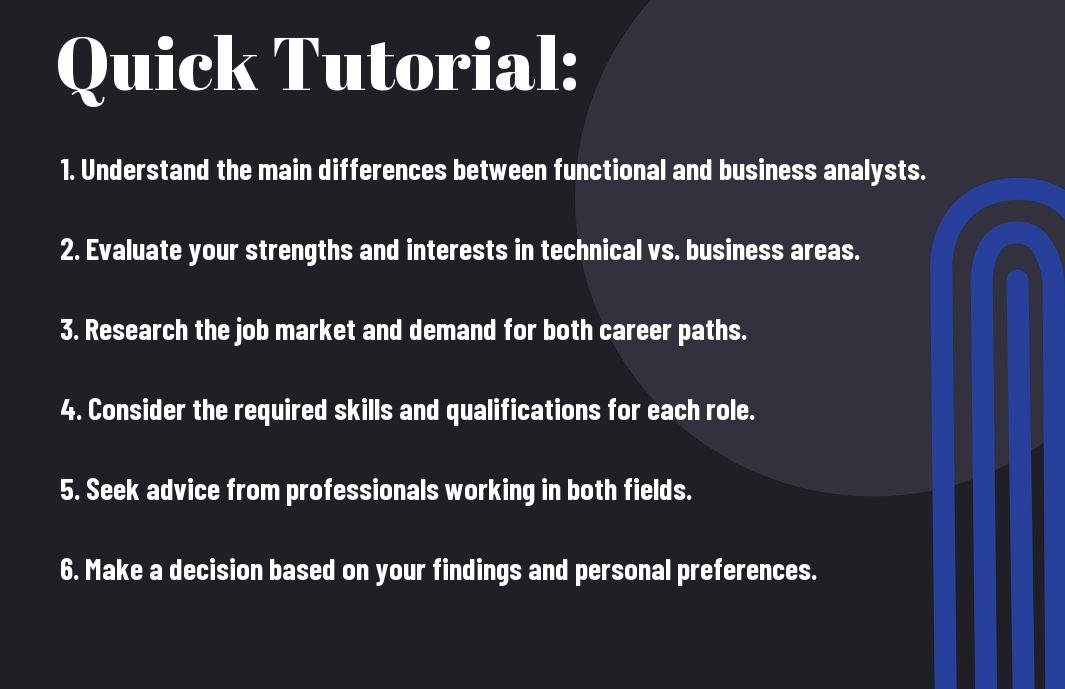Perplexed about whether to pursue a career as a Functional Analyst or a Business Analyst? As someone who has vast experience in both fields, I can provide you with valuable insights to help you make an informed decision. It’s important to understand the key differences between these two roles, and how they align with your strengths, interests, and aspirations. While a Functional Analyst is more focused on the technical aspects of a project, a Business Analyst is more concerned with the overall business strategy and requirements. Understanding these distinctions will allow you to choose the career path that best suits your skills and ambitions. In this tutorial, I will delve into the specifics of each role, the skills and qualifications required, the job prospects, and the potential challenges you may face. By the end, you’ll have a clearer understanding of which path aligns with your goals and interests.
Key Takeaways:
- Difference in Focus: Functional Analysts focus more on system design and technical functionalities, while Business Analysts concentrate on business processes and requirements.
- Technical Skills vs Business Acumen: Functional Analysts require strong technical skills and knowledge of software systems, while Business Analysts need strong business acumen, communication, and stakeholder management skills.
- Job Opportunities: Both career paths offer diverse job opportunities, with Functional Analysts typically working within IT departments and Business Analysts working across various industries.
- Career Growth: Functional Analysts often progress into roles such as Project Manager or Technical Lead, while Business Analysts may transition to roles like Product Manager or Business Consultant.
- Personal Interests and Strengths: To choose the right career path, consider your personal interests and strengths, as well as the specific skills and responsibilities of each role.
Understanding the Role of a Functional Analyst
Your future as a functional analyst will involve working closely with technology and business teams to create and implement systems and processes that meet the needs of the organization. As a functional analyst, I play a crucial role in bridging the gap between business objectives and technical solutions.
Responsibilities and Tasks
As a functional analyst, my responsibilities include gathering and analyzing business requirements, and working with stakeholders to understand their needs and objectives. I then translate these requirements into functional specifications and work closely with the development team to ensure that the solutions meet the business needs. I am also involved in testing and quality assurance to ensure that the systems are functioning as expected and meeting the business requirements.
Required Skills and Qualifications
To excel as a functional analyst, I need to have strong analytical and problem-solving skills, as well as the ability to understand complex business processes. I also need to have excellent communication skills in order to effectively gather and document requirements, and to work with diverse teams. Additionally, I need to have a good understanding of technology and how it can be applied to solve business problems. A background in business analysis or system analysis is often beneficial, as is a good understanding of project management methodologies.
Understanding the Role of a Business Analyst
Any successful business relies on the combination of efficiency, innovation, and strategy. This is where a business analyst comes in. As a business analyst, I help organizations improve their processes, products, services, and software through data analysis, requirements gathering, and solution assessment. My primary focus is on identifying business needs and determining solutions to business problems.
Responsibilities and Tasks
As a business analyst, I am responsible for gathering, analyzing, and documenting business requirements. I work closely with stakeholders to understand their needs and expectations, and then translate those into actionable plans. I conduct research, create and maintain documentation, and facilitate communication between different teams to ensure that the requirements are understood and met. Additionally, I often conduct user acceptance testing to ensure that the implemented solutions meet the business requirements.
Required Skills and Qualifications
One of the most important skills for a business analyst is communication. I must be able to communicate effectively with stakeholders at all levels of the organization, as well as with technical teams. Additionally, critical thinking and problem-solving abilities are crucial in this role, as I need to analyze complex situations and come up with practical solutions. A good understanding of business processes and technology is also essential, as well as the ability to work with various project management methodologies and tools.
Choosing the Right Career Path
Keep in mind that when deciding between a career as a functional analyst or a business analyst, it’s important to carefully evaluate your strengths, interests, the industry and job market, and long-term career growth.
Evaluating Your Strengths and Interests
When considering a career as a functional analyst or a business analyst, it’s essential to evaluate your strengths and interests. As a functional analyst, I would need to have a strong understanding of technical systems and the ability to translate business requirements into functional specifications. On the other hand, as a business analyst, I would need to have excellent communication and analytical skills, as well as a deep understanding of business processes. Reflect on your own strengths and interests to determine which path aligns most closely with your own abilities and passions.
Researching the Industry and Job Market
Researching the industry and job market is crucial when considering a career as a functional analyst or a business analyst. Look into the demand for both roles, the potential for growth, and the types of organizations that typically hire for these positions. Consider the current job market outlook and the projected growth for both roles. It’s also important to assess the potential for advancement and the types of industries that align with your interests and career goals. As you gather this information, you will be better equipped to make an informed decision.
Considering Long-Term Career Growth
When deciding between a career as a functional analyst or a business analyst, it’s important to consider long-term career growth. I would need to think about potential career paths, opportunities for advancement, and the potential for continued learning and development in each field. Reflect on the types of projects, industries, and roles that align with your long-term career goals. It’s essential to consider not only the immediate job opportunities but also the potential for growth and development over the course of your career.

Functional Analyst vs Business Analyst – Which Career Path Should You Choose
Upon reflecting on the differences between a functional analyst and a business analyst, it is clear that each role offers unique opportunities for career growth and development. As a functional analyst, you will be heavily involved in the technical side of systems and software, while as a business analyst, you will focus on the strategic planning and decision-making processes within an organization. It ultimately comes down to your personal interests and strengths. If you thrive in a more technical environment and enjoy problem-solving, the role of a functional analyst may be best suited for you. On the other hand, if you have a strong business acumen and enjoy working with stakeholders to drive strategic initiatives, a career as a business analyst may be the right fit. Whichever path you choose, both roles are crucial in driving organizational success and innovation.
Functional Analyst vs Business Analyst – Which Career Path Should You Choose
Q: What is the role of a Functional Analyst?
A: A Functional Analyst is responsible for analyzing the functional needs of a business and designing solutions to meet those needs. They work closely with stakeholders to understand requirements and use their expertise to translate these into functional specifications for IT systems.
Q: What is the role of a Business Analyst?
A: A Business Analyst is responsible for analyzing the organization’s business processes, identifying areas for improvement, and proposing solutions that enable the organization to achieve its goals. They work to understand the needs of various business stakeholders and bridge the gap between business and IT.
Q: What are the key skills required for a Functional Analyst?
A: Key skills for a Functional Analyst include strong analytical abilities, technical expertise, understanding of business processes, communication skills, and the ability to work collaboratively with both technical and non-technical stakeholders.
Q: What are the key skills required for a Business Analyst?
A: Key skills for a Business Analyst include strong analytical and problem-solving abilities, business acumen, communication and stakeholder management skills, technical knowledge, and the ability to understand and translate business requirements into technical solutions.
Q: Which career path should I choose – Functional Analyst or Business Analyst?
A: The choice between a Functional Analyst and Business Analyst career path depends on your interests and strengths. If you are more technically inclined and enjoy working closely with IT systems and specifications, a career as a Functional Analyst may be a better fit. On the other hand, if you have strong business acumen, enjoy problem-solving, and are passionate about driving business improvements, a career as a Business Analyst may be more suitable for you.

